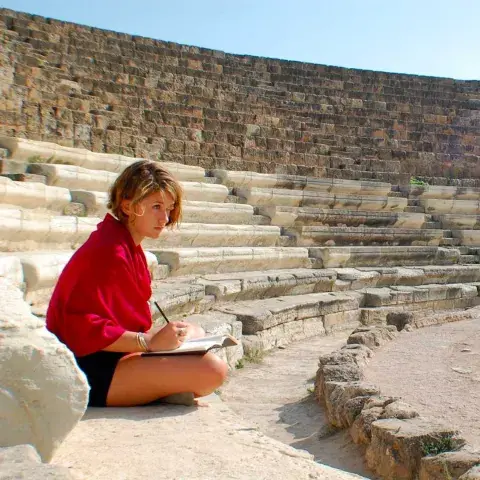
Academic Travel is one of the defining experiences of being a student at Franklin. For many of us, it is the highlight of our time at university. It is a unique opportunity to extend our learning outside the classroom and to study on location with professors who are experts in their fields.
Whether studying “Communications, Fashion and the Formation of Taste” in Milan or “Sustainable Education and ELT” in Madagascar, we know that our travels have an adverse impact on climate change. We need to do our best to reduce our impact where possible.
To help encourage sustainable choices, below are simple tips that have been shared with Academic Travel faculty at Franklin this year.
Transportation
- Walk
- Ride a bike or electric scooter
- Use public transportation
Food Choices
At restaurants:
- Eat at local restaurants rather than food chains
- Eat as little to no meat and animal products as possible; choose vegan/vegetarian dining options
- Choose restaurants that source food locally
At grocery stores/markets:
- Shop at local markets, rather than supermarkets
- Look for bulk stores or bulk sections to save on packaging and lower costs
- Eat organic and avoid Genetically Modified (GM) food
- Look for fair trade labels
- Eat fruits and vegetables that are in season
Waste
- Add a water bottle to the packing list
- Refuse overly packaged goods
- Refuse plastic
- Avoid food waste
Shop
- Support local businesses and artisans
- Buy second-hand
- Buy vegan
Activities
- Respect parks and natural areas
- Opt for activities that minimize the impact on surrounding areas
Accommodations
- Look for accommodations with EcoLabel, Greenkey, or Greenglobe certification
- Choose accommodations situated centrally to reduce your reliance on extensive transportation
The Green Office A.C.T. Program
To the extent that we cannot wholly reduce our impact on carbon emissions during Academic Travel, we can act to reduce our impact in other areas of FUS to at least ensure that we are as neutral as possible in our role at the university and in the world.
The Franklin University Switzerland Green Office has established the Academic Travel Carbon Trading Program (FUS GO ACT) in an effort to mitigate the impact of Academic Travel on Franklin’s overall carbon footprint.
Participants of the FUS GO ACT program make a choice to:
- Calculate. Understand the carbon footprint of Academic Travel by providing details necessary to calculate the carbon emissions generated by each trip.
- Reduce. Identify ways to travel more sustainably and commit to making sustainable travel choices.
- Offset. Dedicate a portion of the Academic Travel budget to ACT carbon credits thru the FUS Green Office.
ACT carbon credits will be applied to a campus program that reduces or eliminates FUS-generated carbon emissions on-site. By signing up for carbon credits, each trade helps to reduce the total amount of carbon emissions generated by the FUS community annually by supporting programs that reduce emissions generated by the FUS community elsewhere.
We hope that learning about, and practicing, sustainability will become an integral part of every Franklin Academic Travel agenda if it isn’t already.
For more information, contact the Franklin University Switzerland Green Office.

